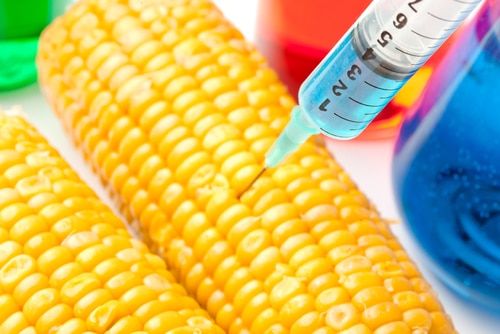 Genetically modified foods are a reality. In fact, estimates are that up to 70% of the items you find in your local supermarket contain genetically-modified ingredients. Although beef, poultry, and fish are not genetically engineered or altered, the animals may have been fed genetically-modified feed. This may change soon. One company is trying to get approval for genetically-modified salmon, so it’s only going to get more challenging. How can you reduce your exposure to them? Certain foods that are more like to contain GMOs than others. Here are some to be aware of.
Genetically modified foods are a reality. In fact, estimates are that up to 70% of the items you find in your local supermarket contain genetically-modified ingredients. Although beef, poultry, and fish are not genetically engineered or altered, the animals may have been fed genetically-modified feed. This may change soon. One company is trying to get approval for genetically-modified salmon, so it’s only going to get more challenging. How can you reduce your exposure to them? Certain foods that are more like to contain GMOs than others. Here are some to be aware of.
Canola Oil
Canola oil comes from rapeseed, a plant related to cabbage. Because naturally occurring rapeseed was high in erucic acid, agricultural engineers selectively bred the plants to modify their genes. This resulted in canola oil that’s less than 2% erucic acid. Why the concerns about erucic acid? Because it’s toxic. The lower levels of erucic acid that are still left in canola oil are believed to be safe, although some people avoid canola oil because of this issue and because they believe it’s genetically altered. Canola oil has been genetically-modified through selective breeding, which isn’t the same as genetic engineering. Still, there are other oils like olive oil that haven’t undergone any genetic modification.
Corn
Almost 90% of American corn is genetically-modified. Previously most of this corn went into animal feed and processed foods, but Monsanto’s began growing GMO sweet corn in 2011. You can now find genetically-modified sweet corn from Monsanto’s on produce stands and in frozen and canned form. Why genetically modify corn? It gives the crop the ability to resist insects because insects die when they eat it. Doesn’t exactly inspire confidence that it’s safe, does it? Unfortunately, GMO corn doesn’t have to be labeled as GMO so you don’t know whether the corn you’re buying is modified unless you buy organic.
Cotton and Cottonseed Oil
Almost 90% of cottonseed oil is genetically modified and is a common ingredient in many processed foods including packaged dressings, salad oils, margarine, sauces, chips, and baked goods. Avoid processed foods as much as possible but when you do buy them, read the label.
Papaya
Asian countries and Hawaii produce genetically-modified papaya. In fact, 75% of the papaya grown in Hawaii is GMO. The reason? Genetic modification makes them resistant to a virus that killed papaya trees in the 1990s. Genetically-modified papaya is resistant to this virus.
Soy
More than 90% of soy in the United States is genetically-modified for economic reasons. You don’t have to necessarily give up soy because you’re trying to avoid GMOs, organic soy is not genetically-modified. Some commercial soymilks and tofu brands are GMO-free, but always read the label to verify that it’s organic, meaning it’s automatically GMO-free or contains no GMOs.
Sugar Beets
Most of the sugar beets grown in the United States are genetically modified. Some of these GMO sugar beets are used to sweeten packaged breakfast cereals. Keep that in mind when you buy a box of packaged cereal.
Summer Squash and Zucchini
Some, but not all, summer squash and zucchini are genetically modified to make them more resistant to viruses.
GMO Foods Are Hard to Avoid
It’s not easy to completely eliminate GMOs from your diet unless you stop buying almost all packaged or processed foods and choose organic. In the United States, manufacturers don’t have to label items that are genetically modified as such. Foods that are certified organic cannot by law contain genetically modified ingredients. You can also look for a label that says “non-GMO project verified,” indicating a third-party has verified the product is free of GMOs.
As you can see, avoiding genetically-modified foods is challenging and you don’t know when you’re eating them unless what you’re eating is organic. The best way to avoid them is to buy the most common genetically-modified foods organic and read labels when you buy packaged foods. That’s a good practice anyway.
References:
The Non-GMO Project. ” The “Non-GMO Project Verified” Seal”
Pro-Quest. “Genetically Modified Foods: Harmful or Helpful?”
Related Articles By Cathe:
How to Avoid Genetically-Modified Foods in Your Diet
Food Labeling: What Do Those Supermarket Labels Really Mean?

